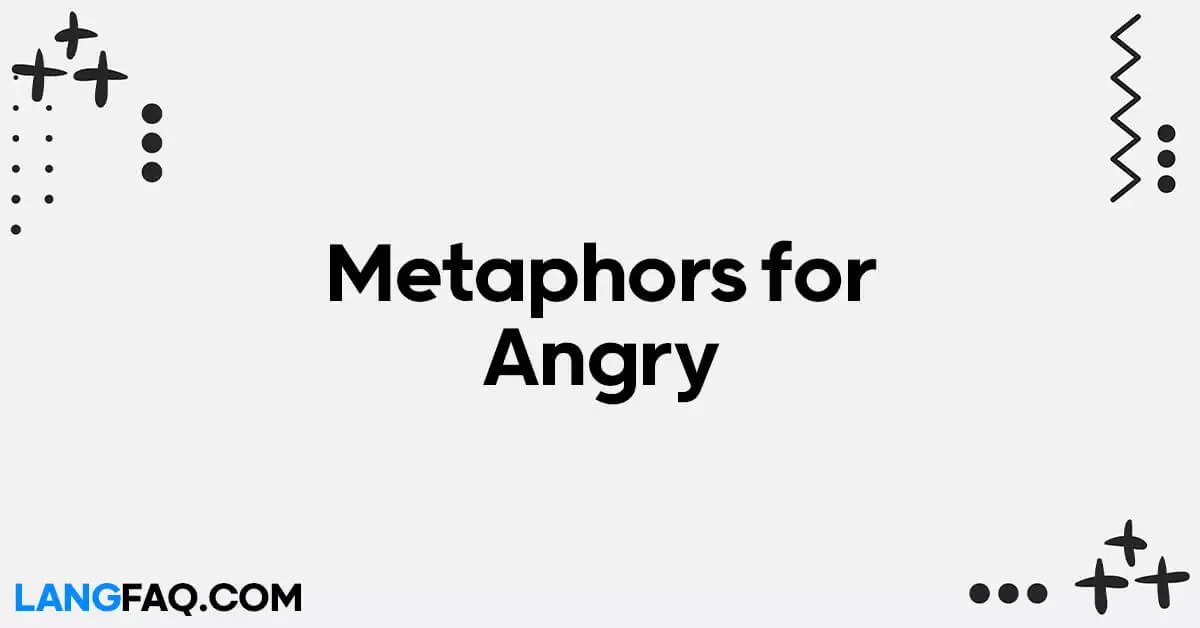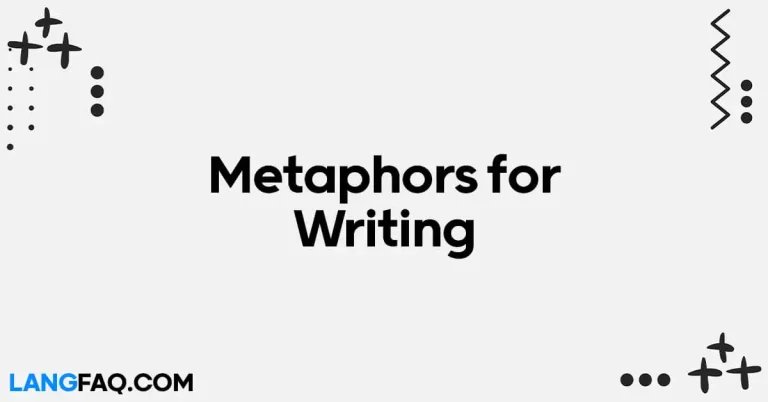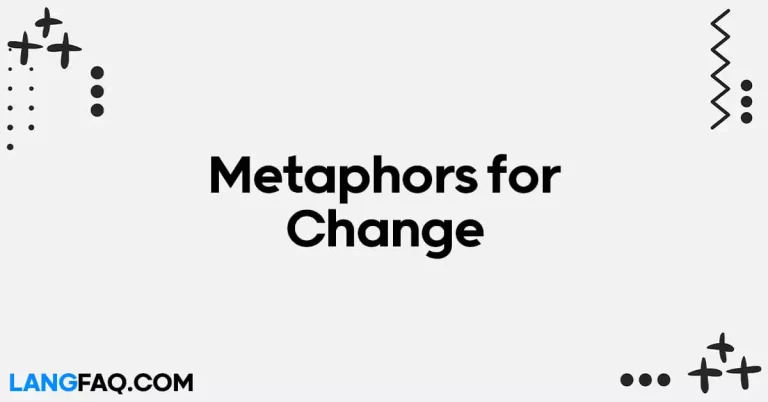Are you feeling like a boiling kettle or a volcano ready to erupt? Emotions can often be challenging to express, especially when it comes to anger. Fortunately, language offers a multitude of metaphors to help us convey the complex feeling of anger. In this comprehensive article, we’ll delve into 26 vivid metaphors for anger, helping you better understand and communicate this powerful emotion.
Anger is a universal emotion that everyone experiences from time to time. It can range from mild irritation to intense rage, and finding the right words to express it can be a struggle. Metaphors provide a creative way to describe and understand anger, making it easier to manage and communicate.
In this article, we’ll explore 26 metaphors for anger, each offering a unique perspective on this emotion. From “seeing red” to “boiling like a teapot,” these metaphors can help you articulate your feelings and connect with others who may be experiencing anger.
Exploring 26 Metaphors for Angry
- Fire in the Belly: When anger burns deep within you, it’s like a fire in your belly that refuses to be extinguished. You feel a searing heat and an intense desire to vent your frustration.
- Seeing Red: This metaphor suggests that when you’re angry, everything you see turns red. It symbolizes the tunnel vision and heightened emotions that come with anger.
- Boiling Point: Imagine anger as water in a pot, gradually heating up until it reaches its boiling point. At that moment, it overflows, just like your anger might.
- Steaming Ears: When you’re furious, it can feel like steam is coming out of your ears, a humorous way to describe your intense frustration.
- On Edge: This metaphor implies that you’re teetering on the edge of losing control when you’re angry, much like a tightrope walker high above the ground.
- Ready to Explode: When anger builds up, it can make you feel like a ticking time bomb, ready to explode with the slightest provocation.
- Burning Bridges: Anger can lead to actions and words that damage relationships irreparably, just like burning bridges behind you.
- Thunderstorm of Emotions: Think of anger as a thunderstorm of emotions brewing within you, with lightning bolts of rage and thunderclaps of frustration.
- Volcano of Wrath: An angry person can be compared to a dormant volcano suddenly erupting with molten fury, causing destruction all around.
- Locked Horns: This metaphor paints a picture of two opposing forces clashing head-on, much like a pair of rutting stags.
- Ticking Time Bomb: Similar to “ready to explode,” this metaphor highlights the impending sense of anger building up inside.
- Fuming Like a Kettle: Like a kettle whistling with steam when it boils, anger can make you fume with visible irritation.
- Raging Bull: Just as a bull charges ferociously when provoked, an angry person might act impulsively and aggressively.
- Tempest in a Teapot: Sometimes, anger can seem disproportionate to the situation, like a tempest (a violent storm) occurring within a small teapot.
- Clenched Fist: A clenched fist symbolizes the physical tension that often accompanies anger, as if you’re ready to strike out.
- Walking on Eggshells: This metaphor illustrates the delicate balance needed to avoid setting off someone’s anger, as if you’re treading on fragile eggshells.
- Hot under the Collar: Imagine your anger as a sudden rush of heat that makes your collar feel uncomfortable and prickly.
- In a Fit of Rage: When anger takes over, it can feel like you’re caught in a fit of uncontrollable rage.
- Steam Coming Out of Your Ears: Similar to steaming ears, this imagery captures the idea of anger causing visible signs of frustration.
- Seeing Through Red-Colored Glasses: This metaphor suggests that when you’re angry, your perception becomes distorted, like seeing the world through red-colored glasses.
- Roaring Like a Lion: Like a lion’s roar, anger can be loud, intimidating, and commanding attention.
- Biting the Bullet: Holding back anger and enduring a difficult situation is akin to biting on a metaphorical bullet.
- Burning with Fury: Picture anger as a burning sensation that engulfs you in a fiery fury.
- Explosive Temper: An explosive temper implies that anger can erupt suddenly and violently.
- Sizzling Anger: Similar to burning, sizzling anger is intense and potentially destructive.
- Rattling the Cage: When you’re angry, it’s as if you’re rattling the cage of your emotions, desperately seeking release.
| Metaphor | Description |
|---|---|
| 1. Fuming like a Kettle | Intense, simmering anger, like a kettle about to boil over. |
| 2. Seeing Red | Anger so intense that everything appears tinted with red. |
| 3. Hot Under the Collar | Sudden burst of anger, often triggered by frustration or irritation. |
| 4. Burning with Rage | Anger compared to a blazing fire, signifying extreme emotional heat. |
| 5. Steam Coming out of Ears | Visualizes anger as steam escaping from one’s ears, indicating extreme frustration. |
| 6. Exploding like a Volcano | Sudden and intense outburst of anger, like a volcanic eruption. |
| 7. Locked in a Pressure Cooker | Feeling trapped in a high-pressure situation, intensifying anger. |
| 8. Ticking Time Bomb | Suppressed anger accumulating and potentially bursting forth unexpectedly. |
| 9. Storm Clouds Gathering | Anger represented as dark clouds gathering before a storm, indicating growing tension. |
| 10. Hitting the Boiling Point | Reaching the maximum level of anger, where control is lost. |
| 11. Raging Bull | Anger compared to a charging bull, signifying intense and aggressive anger. |
| 12. Screaming into a Pillow | Releasing anger by shouting into a pillow to muffle the sound. |
| 13. Fuming Mad | Intense anger that makes a person seem like they’re steaming with rage. |
| 14. Shaking with Rage | Anger so intense that it causes physical trembling or shaking. |
| 15. Claws Out | Readiness to attack or defend due to anger, implying a combative stance. |
| 16. Heart Racing | Increased heartbeat associated with anger, signifying a physiological response. |
| 17. Ready to Blow a Fuse | Being on the brink of losing control and becoming very angry. |
| 18. Seeing Red | Intense anger or rage, as if everything around you turns red. |
| 19. Bristling with Anger | A person visibly displaying signs of anger, such as tense body language. |
| 20. Boiling Over | Anger reaching its maximum point and spilling out uncontrollably. |
| 21. Seething Under the Surface | Hidden anger simmering quietly beneath the exterior. |
| 22. Erupting like a Volcano | Anger compared to a volcanic eruption, signifying a sudden and explosive outburst. |
| 23. On the Verge of Explosion | Being very close to losing one’s temper due to frustration. |
| 24. Hot-Headed | Easily angered, quick to react with anger, or having a short temper. |
| 25. Searing Anger | Anger compared to a burning sensation, indicating intense and emotionally painful anger. |
| 26. Fire in the Belly | Strong and burning passion or determination, often driven by anger or frustration. |
These metaphors provide a vivid and creative way to describe the complex and varied nature of anger in different situations and contexts.
1. Boiling Like a Teapot
Explanation: “Boiling like a teapot” is a metaphor that vividly describes the buildup of anger, similar to water heating up inside a teapot. It implies that anger is reaching its boiling point and is about to release in the form of steam.
Scenario: Imagine a work environment where a colleague keeps making offensive comments. You’ve tolerated it for a while, but now you’re “boiling like a teapot.”
Example Sentence: Formal: “I’ve been patient with your remarks, but now I’m boiling like a teapot. We need to address this issue.”
Informal: “Your constant teasing is really getting to me. I’m boiling like a teapot here!”
Variations:
- In a professional context, you might say, “I’m reaching my limit” instead of “boiling like a teapot.”
- Among friends, you can say, “I’m about to blow a gasket” for a similar effect.
Dictionary Insight: The Cambridge Dictionary defines this metaphor as “to become very angry and show it.”
Usage Tip: Use this metaphor when you want to convey that your anger is escalating and about to be expressed.
2. Walking on Eggshells
Explanation: “Walking on eggshells” describes a situation where any action or word might trigger an explosive reaction. It’s a metaphor for extreme caution and anxiety in a tense environment.
Scenario: Imagine you’re at a family gathering, and your parents are arguing. You feel like you’re “walking on eggshells” to avoid making things worse.
Example Sentence: Formal: “Given the current tension, we need to be careful not to say anything that could provoke a conflict. It’s like walking on eggshells.”
Informal: “I can’t talk to them right now; it’s like walking on eggshells.”
Variations:
- In a professional setting, you might say, “We need to tread lightly” to convey a similar idea.
- Among friends, you can use, “I don’t want to set them off” in a similar context.
Dictionary Insight: The Cambridge Dictionary defines this metaphor as “to be very careful in your actions because you do not want to upset someone or something.”
Usage Tip: Use this metaphor when you want to highlight the need for extreme caution in a delicate or tense situation.
3. Fire in the Belly
Explanation: “Fire in the belly” refers to the burning sensation in your stomach when you’re furious. It implies a deep and intense anger that can be physically felt.
Scenario: Picture a scenario where you’ve been unfairly treated at work, and you feel a deep, simmering anger inside you. You might say you have “fire in the belly.”
Example Sentence: Formal: “The way I’ve been treated is unacceptable, and it’s ignited a fire in my belly to make things right.”
Informal: “I can’t believe they did this to me. I’ve got a real fire in the belly now.”
Variations:
- In a professional context, you can say, “I’m deeply angered” to express a similar sentiment.
- Among friends, you might say, “I’m burning up with rage” for emphasis.
Dictionary Insight: The Cambridge Dictionary doesn’t have a specific entry for this metaphor, but it’s widely recognized in English idiomatic usage.
Usage Tip: Use this metaphor when you want to convey a profound, burning anger that’s deeply felt in your core.
4. Burning Bridges
Explanation: “Burning bridges” is a metaphorical way of expressing anger by destroying relationships or connections, often implying that there’s no turning back.
Scenario: Imagine a situation where a disagreement with a colleague leads to you taking extreme actions that damage your professional relationship. You’ve essentially “burned bridges.”
Example Sentence: Formal: “I regret how I handled the situation; I feel like I’ve burned bridges with my colleague.”
Informal: “I told them exactly what I thought, and now there’s no going back. I’ve really burned some bridges.”
Variations:
- In a professional context, you might say, “I’ve severed ties” to convey a similar outcome.
- Among friends, you can use, “I’ve crossed a line” in a similar context.
Dictionary Insight: The Cambridge Dictionary defines this metaphor as “to do something that makes it impossible to return to a previous situation or relationship.”
Usage Tip: Use this metaphor when you want to emphasize the irreversible damage caused by anger or actions taken in anger.
5. Steam Coming out of Ears
Explanation: “Steam coming out of ears” is a humorous and exaggerated metaphor that visualizes anger as steam escaping from your ears, indicating extreme frustration.
Scenario: Imagine a scenario where someone is stuck in traffic due to a reckless driver. They might say, “I was so angry; I felt like I had steam coming out of my ears.”
Example Sentence: Formal: “The delays in our project were infuriating; I felt like I had steam coming out of my ears during the meeting.”
Informal: “When they canceled our plans last minute, I was so mad; it was like steam coming out of my ears.”
Variations:
- In a professional context, you might say, “I was absolutely livid” to express similar anger.
- Among friends, you can use, “I was so ticked off” in a more casual setting.
Dictionary Insight: The Cambridge Dictionary doesn’t have a specific entry for this metaphor, but it’s a common way to describe extreme anger in informal language.
Usage Tip: Use this metaphor when you want to exaggerate and add a touch of humor to your description of intense anger.
6. Exploding like a Volcano
Explanation: “Exploding like a volcano” is a metaphor that compares anger to a volcano erupting with uncontrollable force. It signifies a sudden and intense outburst of anger.
Scenario: Imagine a situation where someone has been suppressing their anger for a while, and then they finally lose their temper, shouting and expressing their frustration. This can be described as “exploding like a volcano.”
Example Sentence: Formal: “After enduring constant delays, I finally exploded like a volcano in the meeting and expressed my frustration.”
Informal: “When they kept pushing my buttons, I just exploded like a volcano, and I couldn’t hold back anymore.”
Variations:
- In a professional context, you might say, “I lost my composure” to convey a similar idea.
- Among friends, you can use, “I totally blew up” in a more relaxed conversation.
Dictionary Insight: The Cambridge Dictionary defines this metaphor as “to suddenly become very angry and to express your anger.”
Usage Tip: Use this metaphor when you want to emphasize the sudden and uncontrollable nature of anger.
7. Locked in a Pressure Cooker
Explanation: “Locked in a pressure cooker” is a metaphor that describes feeling like you’re trapped in a high-pressure situation that’s causing anger to build. It implies that the environment is intensifying your anger.
Scenario: Imagine a scenario where you’re working on a tight deadline, and there are constant interruptions and demands. You might say, “I feel like I’m locked in a pressure cooker.”
Example Sentence: Formal: “The high expectations and constant stress at work make me feel like I’m locked in a pressure cooker.”
Informal: “With all these deadlines and demands, it’s as if I’m stuck in a pressure cooker.”
Variations:
- In a professional context, you might say, “I’m under immense stress” to convey a similar feeling.
- Among friends, you can use, “I’m in a pressure cooker situation” in a more casual conversation.
Dictionary Insight: The Cambridge Dictionary doesn’t have a specific entry for this metaphor, but it’s a powerful way to describe a stressful situation.
Usage Tip: Use this metaphor when you want to highlight the external factors contributing to your anger and stress.
8. Ticking Time Bomb
Explanation: “Ticking time bomb” describes someone who is ready to explode with anger at any moment. It implies that the person is holding back their anger, but it’s building up and could burst forth unexpectedly.
Scenario: Imagine a colleague who has been silently enduring unfair treatment for a long time. They appear calm, but their anger is growing. You might say, “They’re like a ticking time bomb.”
Example Sentence: Formal: “His calm demeanor is deceiving; he’s like a ticking time bomb, and we need to address his concerns.”
Informal: “She’s been putting up with so much; it’s like she’s a ticking time bomb just waiting to explode.”
Variations:
- In a professional context, you can say, “They’re on the brink of losing their temper” for a similar effect.
- Among friends, you might use, “They’re about to blow” in a more casual conversation.
Dictionary Insight: The Cambridge Dictionary doesn’t have a specific entry for this metaphor, but it’s commonly used to describe a person who is suppressing their anger.
Usage Tip: Use this metaphor when you want to emphasize that someone is holding back their anger, but it’s accumulating over time.
9. Storm Clouds Gathering
Explanation: “Storm clouds gathering” symbolizes anger as dark clouds gathering before a storm. It suggests that anger is brewing beneath the surface and may soon erupt.
Scenario: Imagine a situation where tension is building in a family discussion, but no one has spoken up yet. You could say, “It feels like there are storm clouds gathering.”
Example Sentence: Formal: “Before the negotiation, there were signs of disagreement, like storm clouds gathering on the horizon.”
Informal: “At the family dinner, it was as if there were storm clouds gathering, and I knew something was about to happen.”
Variations:
- In a professional context, you might say, “Tensions are escalating” to convey a similar idea.
- Among friends, you can use, “It’s getting pretty intense” in a more casual setting.
Dictionary Insight: The Cambridge Dictionary doesn’t have a specific entry for this metaphor, but it’s a poetic way to describe the buildup of tension or anger.
Usage Tip: Use this metaphor when you want to highlight the growing intensity of a situation, signaling that conflict may be imminent.
10. Hitting the Boiling Point
Explanation: “Hitting the boiling point” means reaching the maximum level of anger, where you can no longer control your emotions. It implies that anger has escalated to its peak.
Scenario: Imagine a scenario where someone has been patient despite numerous provocations. Finally, they lose their temper and shout. You could say, “They’ve hit the boiling point.”
Example Sentence: Formal: “After enduring repeated disrespect, she finally hit the boiling point and expressed her grievances.”
Informal: “I tried to keep my cool, but when they crossed that line, I hit the boiling point and let them have it.”
Variations:
- In a professional context, you might say, “I’ve reached my limit” to convey a similar sentiment.
- Among friends, you can use, “I’ve had enough” in a more casual conversation.
Dictionary Insight: The Cambridge Dictionary defines this metaphor as “to reach a stage where you can no longer control your anger.”
Usage Tip: Use this metaphor when you want to emphasize that anger has escalated to its highest level.
11. Raging Bull
Explanation: “Raging bull” compares anger to a bull charging aggressively. It signifies intense and aggressive anger.
Scenario: Imagine a heated argument between two individuals where harsh words are exchanged. You could say, “They were like two raging bulls.”
Example Sentence: Formal: “The dispute escalated quickly, with both parties behaving like raging bulls.”
Informal: “They were both so angry and yelling; it was like two raging bulls going at it.”
Variations:
- In a professional context, you might say, “Their confrontation was intense and aggressive” for a similar effect.
- Among friends, you can use, “They were really going at each other” in a more casual conversation.
Dictionary Insight: The Cambridge Dictionary defines this metaphor as “someone who is very angry and likely to behave in a violent way.”
Usage Tip: Use this metaphor when you want to emphasize the intensity and aggressiveness of anger.
12. Screaming into a Pillow
Explanation: “Screaming into a pillow” is a metaphorical way to release anger by shouting into a pillow to muffle the sound. It implies a need to vent or express anger in a less destructive manner.
Scenario: Imagine a scenario where someone is so frustrated that they need to let out their anger without causing a scene. They might say, “I had to resort to screaming into a pillow.”
Example Sentence: Formal: “When the stress became overwhelming, she found solace in screaming into a pillow to release her frustration.”
Informal: “I couldn’t take it anymore, so I screamed into a pillow to let out some steam.”
Variations:
- In a professional context, you might say, “I needed to find a healthy way to cope with my frustration” to convey a similar idea.
- Among friends, you can use, “I had to let off some steam” in a more casual conversation.
Dictionary Insight: The Cambridge Dictionary doesn’t have a specific entry for this metaphor, but it’s a common way to describe a coping mechanism for anger.
Usage Tip: Use this metaphor when you want to convey the need to release anger or frustration in a controlled manner.
13. Fuming Mad
Explanation: “Fuming mad” describes a level of anger so intense that a person is practically steaming with rage. It conveys extreme frustration and irritation.
Scenario: Imagine a situation where someone discovers their car has been towed without any prior notice. They might say, “I was fuming mad when I found out.”
Example Sentence: Formal: “The lack of communication regarding the project changes left me fuming mad.”
Informal: “When they canceled our plans last minute, I was fuming mad; it’s just so inconsiderate.”
Variations:
- In a professional context, you might say, “I was extremely frustrated” to convey a similar emotion.
- Among friends, you can use, “I was absolutely livid” in a more casual conversation.
Dictionary Insight: The Cambridge Dictionary defines “fuming” as “extremely angry, especially because you think someone has treated you unfairly.”
Usage Tip: Use this metaphor when you want to emphasize that someone is seething with anger and frustration.
14. Shaking with Rage
Explanation: “Shaking with rage” signifies anger so intense that it causes physical trembling or shaking. It conveys a loss of emotional control.
Scenario: Imagine a situation where someone receives a series of unfair criticisms during a presentation, and they’re struggling to maintain composure. They might say, “I was shaking with rage up there.”
Example Sentence: Formal: “The unjust critique during the meeting left me shaking with rage; it was difficult to maintain professionalism.”
Informal: “When they accused me of something I didn’t do, I was shaking with rage, and it took all my self-control not to react.”
Variations:
- In a professional context, you can say, “I was visibly upset” to convey a similar emotion without the physical aspect.
- Among friends, you might use, “I was so mad I could hardly contain myself” in a more casual conversation.
Dictionary Insight: The Cambridge Dictionary defines “shaking” as “making small, quick movements from side to side or up and down, or making something do this.”
Usage Tip: Use this metaphor when you want to emphasize the physical manifestations of intense anger and emotional turmoil.
15. Claws Out
Explanation: “Claws out” signifies that someone is ready to attack or defend themselves due to anger. It implies a combative and defensive stance.
Scenario: Imagine a heated argument between two individuals, both of whom are determined to prove their point. You could say, “They entered the discussion with their claws out.”
Example Sentence: Formal: “In the negotiation, both parties came with their claws out, making it challenging to find common ground.”
Informal: “When they accused me of cheating, I had to come back with my claws out to defend myself.”
Variations:
- In a professional context, you might say, “They were prepared to strongly assert their position” for a similar effect.
- Among friends, you can use, “They were ready for a fight” in a more casual conversation.
Dictionary Insight: The Cambridge Dictionary defines “claws” as “the thin, sharp, curved nails on the feet of some birds and animals.”
Usage Tip: Use this metaphor when you want to emphasize the readiness to engage in a confrontational or defensive manner due to anger.
16. Heart Racing
Explanation: “Heart racing” refers to the increased heartbeat associated with anger. It implies a physiological response to intense emotions.
Scenario: Imagine a situation where someone receives an unexpected and infuriating email from a coworker. They might say, “When I read that email, my heart was racing.”
Example Sentence: Formal: “The unexpected news left me with a racing heart and a sense of urgency to address the issue.”
Informal: “When they accused me of wrongdoing, my heart started racing; I couldn’t believe it.”
Variations:
- In a professional context, you can say, “I was experiencing heightened stress” to convey a similar physiological response.
- Among friends, you might use, “My heart was pounding” in a more casual conversation.
Dictionary Insight: The Cambridge Dictionary defines “racing” as “moving or happening very quickly.”
Usage Tip: Use this metaphor when you want to highlight the physical effects of intense anger, such as an increased heart rate.
17. Ready to Blow a Fuse
Explanation: “Ready to blow a fuse” expresses the feeling of being on the brink of losing control and becoming very angry. It implies that anger is reaching a critical point.
Scenario: Imagine a scenario where someone is dealing with a continuously malfunctioning piece of equipment at work. They might say, “I was ready to blow a fuse.”
Example Sentence: Formal: “The repeated technical issues left me feeling ready to blow a fuse during the presentation.”
Informal: “When they messed up my order for the third time, I was ready to blow a fuse; it’s just so frustrating.”
Variations:
- In a professional context, you can say, “I was nearing my breaking point” to convey a similar sentiment.
- Among friends, you might use, “I was about to lose it” in a more casual conversation.
Dictionary Insight: The Cambridge Dictionary defines “blow a fuse” as “to become very angry.”
Usage Tip: Use this metaphor when you want to convey the sense that someone is on the verge of losing their temper due to frustration or anger.
18. Seeing Red
Explanation: “Seeing red” is a metaphor that suggests intense anger or rage, as if everything around you turns red due to heightened emotions.
Scenario: Imagine a situation where someone receives infuriating news that makes them see the world differently. They might say, “I was seeing red after I heard that.”
Example Sentence: Formal: “The unfair treatment made me see red, and I knew I had to address the issue.”
Informal: “When they accused me of something I didn’t do, I was seeing red; it’s just so frustrating.”
Variations:
- In a professional context, you can say, “I was extremely angry” to convey a similar emotion.
- Among friends, you might use, “I was so mad I couldn’t see straight” in a more casual conversation.
Dictionary Insight: The Cambridge Dictionary doesn’t have a specific entry for this metaphor, but it’s a common way to describe intense anger.
Usage Tip: Use this metaphor when you want to emphasize the intensity and overwhelming nature of anger.
19. Bristling with Anger
Explanation: “Bristling with anger” describes a person who is visibly displaying signs of anger, such as tense body language or raised hair on their skin.
Scenario: Imagine a situation where someone is in a heated argument, and their body language becomes tense and defensive. You could say, “They were bristling with anger.”
Example Sentence: Formal: “During the discussion, he became defensive and was bristling with anger.”
Informal: “When they insulted him in front of everyone, he was bristling with anger; you could see it in his posture.”
Variations:
- In a professional context, you can say, “He displayed visible signs of frustration” to convey a similar idea.
- Among friends, you might use, “He was ready to explode” in a more casual conversation.
Dictionary Insight: The Cambridge Dictionary defines “bristle” as “to react angrily or defensively to something.”
Usage Tip: Use this metaphor when you want to emphasize how someone’s body language and demeanor reveal their anger.
20. Boiling Over
Explanation: “Boiling over” is a metaphor that signifies anger reaching its maximum point and spilling out uncontrollably, similar to a pot of boiling water overflowing.
Scenario: Imagine a situation where someone has been bottling up their frustration for a long time, and then they finally lose their temper in an explosive outburst. You could say, “They were boiling over.”
Example Sentence: Formal: “The constant delays and miscommunication eventually led to the team’s frustration boiling over.”
Informal: “After enduring their constant criticism, my patience finally boiled over, and I confronted them.”
Variations:
- In a professional context, you can say, “The situation became unmanageable” to convey a similar outcome.
- Among friends, you might use, “I couldn’t contain my anger anymore” in a more casual conversation.
Dictionary Insight: The Cambridge Dictionary defines this metaphor as “to become so angry or excited that you can no longer control yourself.”
Usage Tip: Use this metaphor when you want to emphasize that anger has reached a point where it can no longer be contained.
21. Seething Under the Surface
Explanation: “Seething under the surface” describes a situation where anger is simmering quietly beneath the exterior, waiting to erupt. It implies a hidden anger.
Scenario: Imagine a scenario where someone is silently enduring mistreatment, and their anger is building up, although they haven’t shown it yet. You could say, “They were seething under the surface.”
Example Sentence: Formal: “Despite their composed demeanor, it was clear that their frustration was seething under the surface.”
Informal: “When they kept making excuses, I knew they were seething under the surface, even if they didn’t say anything.”
Variations:
- In a professional context, you can say, “Their anger was hidden but palpable” to convey a similar idea.
- Among friends, you might use, “They were quietly fuming” in a more casual conversation.
Dictionary Insight: The Cambridge Dictionary doesn’t have a specific entry for this metaphor, but it’s a common way to describe hidden anger.
Usage Tip: Use this metaphor when you want to highlight the presence of anger that hasn’t been expressed yet but is building up internally.
22. Erupting like a Volcano
Explanation: “Erupting like a volcano” is a metaphor that compares anger to a volcanic eruption—a sudden and explosive outburst of intense emotions.
Scenario: Imagine a scenario where someone has been holding back their anger for a while, and then they finally lose their temper in a dramatic way. You could say, “They erupted like a volcano.”
Example Sentence: Formal: “The mounting frustrations eventually led to a heated argument, with both parties erupting like a volcano.”
Informal: “When they insulted him in front of everyone, he erupted like a volcano; it was quite a scene.”
Variations:
- In a professional context, you can say, “The situation escalated rapidly” to convey a similar outcome.
- Among friends, you might use, “They blew up” in a more casual conversation.
Dictionary Insight: The Cambridge Dictionary defines this metaphor as “to suddenly become very angry and to express your anger.”
Usage Tip: Use this metaphor when you want to emphasize the sudden and explosive nature of anger, often accompanied by a dramatic display of emotions.
23. On the Verge of Explosion
Explanation: “On the verge of explosion” describes a person who is teetering on the edge of losing their temper. It implies that their anger is at a critical point.
Scenario: Imagine a situation where someone has been enduring frustrating circumstances, and they’re about to lose their patience. You could say, “They were on the verge of explosion.”
Example Sentence: Formal: “After hours of waiting and delays, he was on the verge of explosion, and we had to address the issue immediately.”
Informal: “When they accused me of something I didn’t do, I was on the verge of explosion, but I managed to stay calm.”
Variations:
- In a professional context, you can say, “They were nearing their breaking point” to convey a similar sentiment.
- Among friends, you might use, “They were about to snap” in a more casual conversation.
Dictionary Insight: The Cambridge Dictionary defines “verge” as “the point at which something starts.”
Usage Tip: Use this metaphor when you want to emphasize that someone is very close to losing their temper due to frustration or anger.
24. Hot-Headed
Explanation: “Hot-headed” describes a person who is easily angered, quick to react with anger, or has a short temper.
Scenario: Imagine a coworker who reacts strongly and impulsively to criticism. You could say, “He’s quite hot-headed.”
Example Sentence: Formal: “Dealing with a hot-headed colleague can be challenging, as they tend to react emotionally to feedback.”
Informal: “He’s a bit hot-headed, so it’s best to approach him calmly to avoid escalating conflicts.”
Variations:
- In a professional context, you might say, “He’s emotionally reactive” to convey a similar trait.
- Among friends, you can use, “He’s easily fired up” in a more casual conversation.
Dictionary Insight: The Cambridge Dictionary defines “hot-headed” as “likely to become angry or excited very quickly and easily.”
Usage Tip: Use this metaphor when you want to describe someone who has a tendency to react with anger or frustration impulsively.
25. Searing Anger
Explanation: “Searing anger” compares anger to a burning sensation, indicating intense and emotionally painful anger.
Scenario: Imagine a situation where someone has been deeply hurt by a friend’s actions, and they’re struggling with their emotions. You could say, “They were filled with searing anger.”
Example Sentence: Formal: “The betrayal left her with searing anger and a sense of emotional pain that was hard to bear.”
Informal: “When they let me down in such a crucial moment, I was filled with searing anger; it hurt.”
Variations:
- In a professional context, you can say, “I was overwhelmed by emotional distress” to convey a similar feeling.
- Among friends, you might use, “I was burning with anger” in a more casual conversation.
Dictionary Insight: The Cambridge Dictionary defines “searing” as “extremely hot or painful.”
Usage Tip: Use this metaphor when you want to emphasize the intensity and emotional pain associated with anger.
26. Fire in the Belly
Explanation: “Fire in the belly” suggests that someone has a strong and burning passion or determination, often driven by anger or frustration.
Scenario: Imagine a scenario where someone is motivated to prove themselves after facing criticism. You could say, “They have a fire in the belly.”
Example Sentence: Formal: “Despite the setbacks, he has a fire in the belly to succeed and prove his critics wrong.”
Informal: “When they doubted my abilities, it ignited a fire in the belly to excel and prove them all.”
Variations:
- In a professional context, you can say, “He’s highly motivated” to convey a similar determination.
- Among friends, you might use, “He’s got that inner fire” in a more casual conversation.
Dictionary Insight: The Cambridge Dictionary defines “fire in the belly” as “a strong determination to do something, even if it is very difficult.”
Usage Tip: Use this metaphor when you want to describe someone who is driven by a passionate and determined response to criticism or challenges.
Now that we’ve explored these 26 metaphors for anger, you have a rich collection of expressions to describe and understand various facets of this complex emotion. These metaphors provide vivid imagery and help convey the depth and intensity of anger in different situations and contexts. Whether you’re writing a formal document, having a conversation with a friend, or addressing a professional situation, these metaphors offer a powerful way to express and relate to the experience of anger.
Frequently Asked Questions (FAQs)
Q: How can I manage my anger effectively? A: Managing anger involves recognizing your triggers, practicing deep breathing, and seeking professional help if needed.
Q: Are there healthy ways to express anger? A: Yes, healthy ways to express anger include talking calmly, using “I” statements, and finding constructive outlets like exercise or journaling.
Q: Can chronic anger be harmful to my health? A: Yes, chronic anger is associated with various health issues, including high blood pressure, heart problems, and weakened immune function.
Q: Is anger always a negative emotion? A: While anger can be a natural response to certain situations, it’s essential to manage it constructively and not let it control your actions.
Q: What role does forgiveness play in dealing with anger? A: Forgiveness can be a powerful tool in managing anger, as it allows you to let go of resentment and move forward.
Q: Are there cultural differences in how anger is expressed? A: Yes, anger expression varies across cultures, with some societies valuing emotional restraint while others encourage more open expression.
Conclusion
Exploring these 26 metaphors for anger gives us insight into the multifaceted nature of this emotion. While anger is a part of the human experience, it’s essential to manage it in healthy ways to maintain our well-being and relationships. So, the next time you feel anger creeping in, remember these metaphors and choose a creative way to express what you’re feeling.







